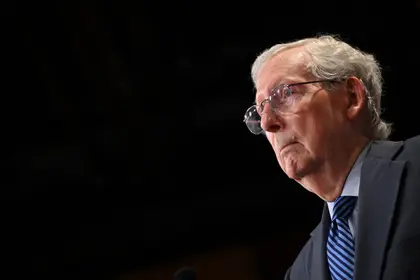The US Senate voted 80-19 on Tuesday afternoon to break a filibuster and send a $95 billion international aid package to a final vote on the floor. This was the last significant hurdle to procuring $61 billion in aid for Kyiv, a measure that has languished in Washington for months.
The bill, presented to the Senate by the House of Representatives over the weekend, needed to clear this procedural vote or else face a number of amendments proposed by opponents of the aid package as written.
JOIN US ON TELEGRAM
Follow our coverage of the war on the @Kyivpost_official.
A final, up-and-down vote on the aid package is expected to pass smoothly when it reaches the Senate floor as early as Tuesday evening. President Joe Biden has made it clear he will sign the bill into law when it reaches his desk.
The motion to include an “amendment tree” was submitted by Sen. Mike Lee (R-UT), who called the $61 billion in funding for Ukraine “massively controversial” in the Tuesday morning session, and said that the legislative body should be allowed to debate the bill rather than be a “rubber stamp.”
Sen. Lee, who has long been criticized by the left for his Kremlin-friendly remarks, downplayed the possibility of any damage by allowing the Senate to take some extra time to debate the package.
“There won’t be dogs and cats living together in the streets of the holy city or anything else from the Book of Revelation,” Lee remarked.

Holocaust Survivor Says Germany Must Help Ukraine
On social media, Lee posted on Tuesday: “I will not vote for this 95 billion dollar broken promise. Americans deserve a secure country, not endless proxy wars fueled by their tax dollars. 41 Senators can kill it.”
I will not vote for this 95 billion dollar broken promise.
— Mike Lee (@SenMikeLee) April 23, 2024
Americans deserve a secure country, not endless proxy wars fueled by their tax dollars.
41 Senators can kill it.
Stay tuned.
I agree with @BernieSanders.
— Mike Lee (@SenMikeLee) April 23, 2024
The world's "greatest deliberative body" must be allowed to debate and amend major laws. pic.twitter.com/DRNiHH3kiP
As massive pro-Palestinian protests erupted at college campuses across the country, from the University of California-Berkeley to Columbia University in New York, Vermont Independent Bernie Sanders suggested two amendments to the $25 billion Israel portion of the bill. His proposed amendments would have broadened the scope of funding to humanitarian organizations serving refugees in Gaza, and would “end [certain aspects of] funding to Netanyahu’s war machine… that has killed thirty-four thousand civilians already.”
Ultimately, however, the procedural measure was shepherded through the upper chamber by a broad coalition. That bi-partisan majority was represented in the debate session most notably by: Susan Collins, moderate Republican of Maine, who, dressed in blue and yellow for the occasion, set out to “debunk the myth” that Europe was lagging behind in support for Kyiv; President pro-tempore of the Senate Patty Murray (D-WA), who said, “any further delays will waste time we do not have, and that our allies do not have”; and Dan Sullivan (R-AK), a former Marine who has been hawkish about America’s role in defending Ukraine against the Russian full-scale invasion.
When asked by reporters afterward why it took so long to get Republicans on board with the aid package, Senate Minority Leader Mitch McConnell (R-KY) offered, “The demonization of Ukraine was started by [conservative pundit] Tucker Carlson, who ended up, in my opinion, where he should have been all along: interviewing Vladimir Putin… and he convinced a lot of rank-and-file Republicans that this was a mistake.”
Senate Majority Leader Chuck Schumer (D-NY) added, “The finish line is now in sight,” and called the bill “a watershed moment for the defense of democracy.”
You can also highlight the text and press Ctrl + Enter










